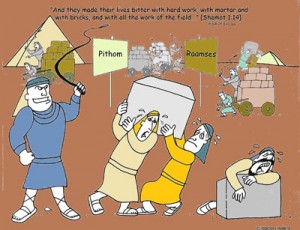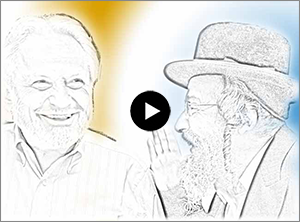Parshas Shemos
I went to a Kiddush this Shabbos, Parshas Shemos, and I heard a nice idea about Jewish Beliefs from the Rabbi that hosted the Kiddush. Now, Chazal (Our Sages) tell us that we should tell over words of Torah in the name of him who said it, but not everyone appreciates his name being mentioned on the internet.
Searching for Jewish Beliefs? Click Here for my main article on Jewish Beliefs.
Parsha: Pharaoh
The Parsha recounts that Pharaoh’s sorcerers warned him that there is going to be a male child born who will redeem the Jewish people. So Pharaoh called in personally the two Jewish midwives, Yocheved and Miriam, and ordered them to kill any male children who are born. The midwives didn’t listen to Pharaoh, indeed they did the opposite, they supplied the children with water and food. When his intelligence mechanism discovered that his decree was not being carried out, Pharaoh called Yocheved and Miriam in again and challenged them why did they not listen to him, and they gave a seemingly lame excuse and got away with it. The Torah recounts in verse (posuk) 21 that since the midwives feared the A’lmighty etc., He gave them a reward. One can ask, what is the emphasis in mentioning that the midwives feared the A’lmighty. It is superfluous, it would seem. This question will make more sense if you see the verses inside.
Parsha: The A’lmighty
The Rav explained that there is an idea of raising up a feeling back to its source. Take fear, when a person is afraid of something, ultimately what he has to be afraid of is the A’lmighty Himself who is running the world, pulling the strings, so to speak. If a person can direct, deflect, that fear and use it to fear the A’lmighty, then he has raised up the fear to its source, and has put into a more proper perspective the actual problem that he has in front of him right now.
The same thing is true of desire. A person has an urge for something, anything. Ultimately, and I must be unfairly brief, the ultimate urge that there is, is for the Ribono Shel Olam (the A’lmighty) Himself. The book Mesilas Yesharim speaks this out very nicely, that the whole creation of the world was only because of “derech hatov lehaitiv”, it is the way of goodness (here, G-d) to do good to others, the whole creation of the world was only to give the maximum pleasure to His creatures, and that maximum pleasure, yes, even more than pecan pie, is to be close to the Ribono Shel Olam Himself. And in order that this pleasure should not be “nahama dekisufa”, accompanied by the embarrassment that a person feels when he receives something that he knows is not coming to him, that G-d created this whole world of Olam Hazeh, in order that we may earn our share, so to speak, by choosing good and avoiding evil. The matter is indeed lengthy, and here is not really the forum.
Pharaoh at the time, if I am not in error, basically controlled the entire world, like it was with other empires later, Babylon, Paras, Rome. Pharaoh was a massively powerful ruler, who had no problem in enforcing his desires. Chazal tell us that towards the end of the galus that Pharaoh developed leprosy, and slaughtered Jewish babies in order to make daily baths from their blood, (to cure himself I understand). This ruler of the whole world subpoenaed to himself personally two Jewish daughters, and personally ordered them to do something, then caught them that they betrayed him, and subpoenaed them again personally to himself to challenge them why they disobeyed. This is about the height of terror which is possible.
So they recognized that this is new kind of fear, a higher level of fear that has ever been experienced by them, so they lifted it up to its source and turned around that fear to fear the Ribono Shel Olam (alone). That is what the verse means, “And it came to pass when the midwives feared the A’lmighty etc.” That their special inovation in Yiras Shamayim invoked from Heaven a special reward.
Parsha: Rabbi Akiva Eiger
The Rabbi concluded with a well known story, that when Rabbi Akiva Eiger was appointed to be the Rav in Posen, on his coronation day, so to speak, the community gave him a royal celebration. Everyone took to the streets with horns and singing and dancing. Even his carriage, instead of being driven by horses, was carried by members of the community. Rabbi Akiva Eiger sat in the carriage and cried, knowing that all of this celebration was not coming to him as he was indeed not deserving of it, and he imagined all of the Heavenly punishment which is waiting for him because people think more of him than for what he is really worth.
Parsha: The Chasam Sofer
The same story happened with the Chasam Sofer when he entered the Rabbinate in Pressburg, just with a little twist. When he saw all of the celebrating, he ask someone what was all the fuss, and they answered him, this is all for you. Contemplated the Chasam Sofer: Why are they so happy, because I have a nice looking beard? No, it is because of my Torah learning, and that they think that I am G-d fearing. Well, the Torah is G-d’s Torah, and the fear is the fear of G-d, so then what they are actually celebrating is more the connection with Hashem Yisborach, not particularly for me. Well, I can’t be left sitting on the side when such good deeds are being done. So he got out of the carriage, and started dancing with everyone else. “Yamim Al Yemai Melech Tosif …” until one of the heads of the community approached him and suggested that the way he is behaving is a bit inappropriate. What would be more acceptable is if he sits down showing some humility …
When these stories reached the ears of the Tzanzer Rebbe the Divrei Chaim, he commented, “The behavior of Rabbi Akiva Eiger is gevaldig, he took the honor that was being bestowed upon him and ripped it up into little pieces. But he didn’t even come close to that which the Chasam Sofer did. He took all of the honor and raised it up so that the honor was directed to Hashem Yisborach.”
Boruch Rappaport






Leave A Response